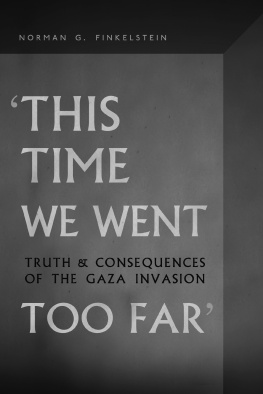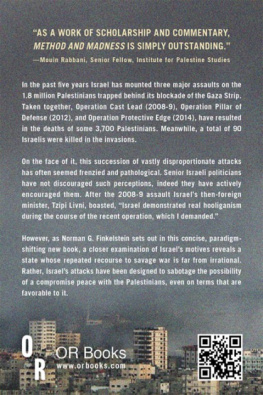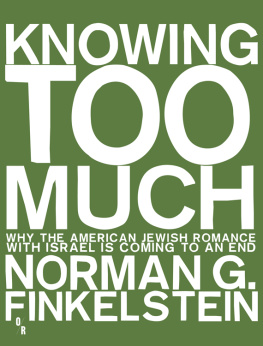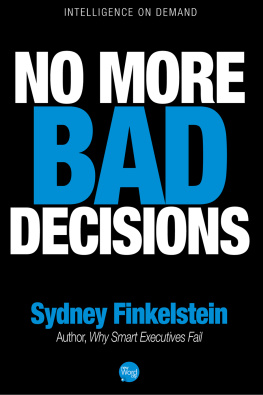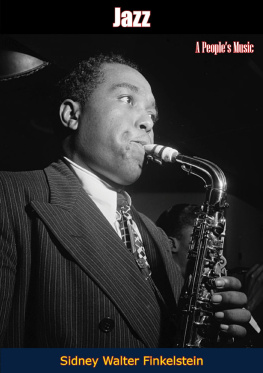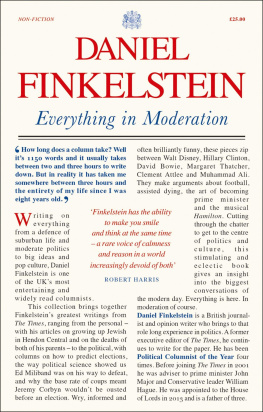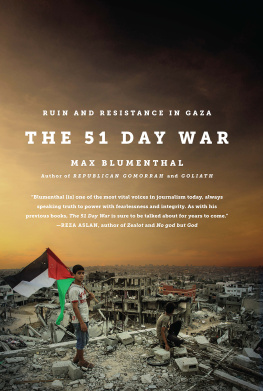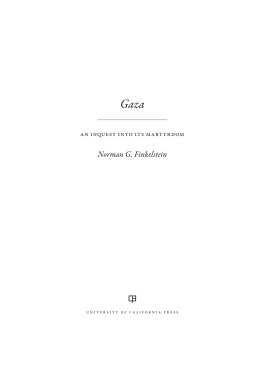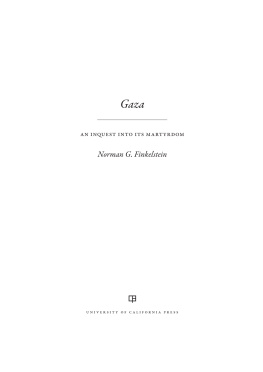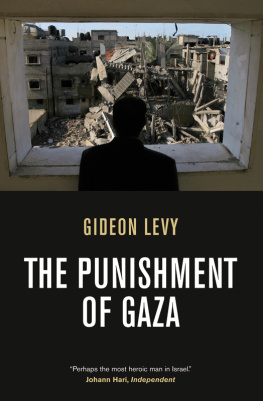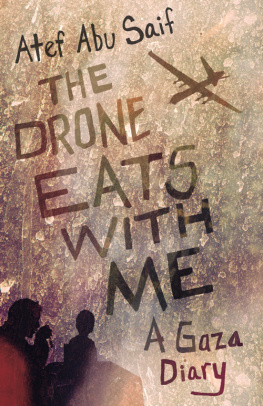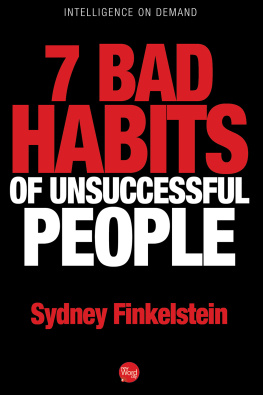Finkelstein - This Time We Went Too Far: truth and Consequences of the Gaza invasion
Here you can read online Finkelstein - This Time We Went Too Far: truth and Consequences of the Gaza invasion full text of the book (entire story) in english for free. Download pdf and epub, get meaning, cover and reviews about this ebook. City: Gazastrook;Israël (staat);New York;NY, year: 2015;2010, publisher: OR Books, genre: Politics. Description of the work, (preface) as well as reviews are available. Best literature library LitArk.com created for fans of good reading and offers a wide selection of genres:
Romance novel
Science fiction
Adventure
Detective
Science
History
Home and family
Prose
Art
Politics
Computer
Non-fiction
Religion
Business
Children
Humor
Choose a favorite category and find really read worthwhile books. Enjoy immersion in the world of imagination, feel the emotions of the characters or learn something new for yourself, make an fascinating discovery.
- Book:This Time We Went Too Far: truth and Consequences of the Gaza invasion
- Author:
- Publisher:OR Books
- Genre:
- Year:2015;2010
- City:Gazastrook;Israël (staat);New York;NY
- Rating:3 / 5
- Favourites:Add to favourites
- Your mark:
- 60
- 1
- 2
- 3
- 4
- 5
This Time We Went Too Far: truth and Consequences of the Gaza invasion: summary, description and annotation
We offer to read an annotation, description, summary or preface (depends on what the author of the book "This Time We Went Too Far: truth and Consequences of the Gaza invasion" wrote himself). If you haven't found the necessary information about the book — write in the comments, we will try to find it.
This Time We Went Too Far: truth and Consequences of the Gaza invasion — read online for free the complete book (whole text) full work
Below is the text of the book, divided by pages. System saving the place of the last page read, allows you to conveniently read the book "This Time We Went Too Far: truth and Consequences of the Gaza invasion" online for free, without having to search again every time where you left off. Put a bookmark, and you can go to the page where you finished reading at any time.
Font size:
Interval:
Bookmark:
of the Gaza Invasion

OR BOOKS
NEW YORK
First published by OR Books, New York, 2010
Copyright Norman G. Finkelstein www.orbooks.com
Hardcover ISBN: 978-0-9842950-3-6
Ebook ISBN: 978-0-9842950-4-3
Library of Congress Cataloging-in-Publication Data
A CIP Record is available for this book from the Library of Congress
British Library Cataloguing-in-Publication Data
A CIP Record is available for this book from the British Library
Printed by Book Mobile in the United States of America
To Carol and Noam,
for being there
Its not that youre out to carry out a massacre, but...
Israeli commander brieng soldiers on eve of Gaza invasion
Colin Robinson was instrumental in the books conception and Maren Hackmann in its execution. Cyrus Veeser lent his golden touch during the nal stage of editing. I am grateful for the Biosocial Research Foundations support, and for the assistance of Rudolph Baldeo, Anna Baltzer, Regan Boychuk, Noam Chomsky, John Dugard, Mirene Ghossein, Asma Ishak, Mike Lev y, Darryl Li, Sanjeev Mahajan, Frank Menetrez, Allan Nairn, Mouin Rabbani, Sara Roy, Feroze Sidhwa, and Eugenia Tsao. I also greatly beneted from references forwarded to me by correspondents.
Alongside many others I have devoted much of my adult life to the achievement of a just peace between Israel and Palestine. It cannot be said that Palestinians living under occupation have derived much benet from these eorts. The Israeli juggernaut proved unstoppable. The changes that have occurred have only been for the worse. Under the guise of what is called the peace process Israel has eectively annexed wide swaths of the West Bank and shredded the social fabric of Palestinian life there and in the Gaza Strip.
It would nonetheless be unduly pessimistic to say that no progress has been made. Israel can no longer count on reexive support for its policies. Public opinion polls not only outside but also inside Jewish communities around the world over the past decade reveal a growing unease with Israeli conduct. This shift largely stems from the fact that the public is now much better informed. Historians have dispelled many of the myths Israel propagated to justify its dispossession and displacement of Palestines indigenous population; human rights organizations have exposed Israels mistreatment of Palestinians living under occupation; and a consensus has crystallized in the legal-diplomatic arena around a settlement of the conict that upholds the basic rights of Palestinians.
The simmering discontent with Israeli conduct reached boiling point in December 2008 when Israel invaded Gaza. The merciless Israeli assault on a defenseless civilian population evoked widespread shock and disgust. Deep ssures opened up in the Jewish communities, especially among the younger generations. Many of Israels erstwhile supporters who did not vocally dissent chose to remain silent rather than defend the indefensible.
The rst part of this book analyzes the motives behind Israels assault on Gaza and chronicles what Amnesty International called 22 days of death and destruction. The least that we owe the people of Gaza is an accurate record of the suering they endured. No one can bring back the dead or restore the shattered lives of those who survived, but we can still respect the memory of their sacrice by preserving it intact.
This book is not just a lament, however; it also sets forth grounds for hope. The bloodletting in Gaza has roused the worlds conscience. The prospects have never been more propitious for galvanizing the public not just to mourn but also to act. We have truth on our side, and we have justice on our side. These become mighty weapons once we have learned how to wield them eectively. The challenge now is twofold: to master, and inform the public of, the unvarnished record of what happened in Gaza; and then to mobilize the public around a settlement of the conict that all of enlightened opinion has embracedbut that Israel and the United States, standing in virtual isolation, have rejected. It is my hope that this book will help meet this challenge and, ultimately, enable everyone, Palestinian and Israeli, to live a dignied life.
On 29 November 1947 the United Nations General Assembly approved a resolution dividing British-mandated Palestine into a Jewish state incorporating 56 percent of Palestine and an Arab state incorporating 44 percent of it. In the ensuing war the newly born State of Israel expanded its borders to incorporate nearly 80 percent of Palestine. The only areas of Palestine not conquered comprised the West Bank, which the Kingdom of Jordan subsequently annexed, and the Gaza Strip, which came under Egypts administrative control. Approximately 250,000 Palestinians driven out of their homes during the 1948 war and its aftermath ed to Gaza and overwhelmed the indigenous population of some 80,000.
Today 80 percent of Gazas inhabitants consist of refugees from the 1948 war and their descendants, and more than half of the population is under 18 years of age. Its current 1.5 million inhabitants are squeezed into a sliver of land 25 miles long and ve miles wide, making Gaza one of the most densely populated places in the world. The panhandle of the Sinai Peninsula, Gaza is bordered by Israel on the north and east, Egypt on the south, and the Mediterranean Sea on the west. In the course of its four-decade-long occupation beginning in June 1967, and prior to Prime Minister Ariel Sharons redeployment of Israeli troops from inside Gaza to its perimeter in 2005, Israel had imposed on Gaza a uniquely exploitive regime of de-development that, in the words of Harvard political economist Sara Roy, deprived the native population of its most important economic resourcesland, water, and laboras well as the internal capacity and potential for developing those resources.
The road to modern Gazas desperate plight is paved with many previous atrocities, most long forgotten or never known outside Palestine. After the cessation of battleeld hostilities in 1949, Egypt kept a tight rein on the activity of Fedayeen (Palestinian guerrillas) in Gaza until February 1955, when Israel launched a bloody cross-border raid into Gaza killing 40 Egyptians. Israeli leaders had plotted to lure Egypt into war in order to topple President Gamal Abdel Nasser, and the Gaza raid proved the perfect provocation as armed border clashes escalated. In October 1956 Israel (in collusion with Great Britain and France) invaded the Egyptian Sinai and occupied Gaza, which it had long coveted. The prominent Israeli historian Benny Morris described what happened next:
Many Fedayeen and an estimated 4,000 Egyptian and Palestinian regulars were trapped in the Strip, identied, and rounded up by the IDF [Israel Defense Forces], GSS [General Security Service], and police. Dozens of these Fedayeen appear to have been summarily executed, without trial. Some were probably killed during two massacres by the IDF troops soon after the occupation of the Strip. On 3 November, the day Khan Yunis was conquered, IDF troops shot dead hundreds of Palestinian refugees and local inhabitants in the town. One U.N. report speaks of some 135 local residents and 140 refugees killed as IDF troops moved through the town and its refugee camp searching for people in possession of arms.
Font size:
Interval:
Bookmark:
Similar books «This Time We Went Too Far: truth and Consequences of the Gaza invasion»
Look at similar books to This Time We Went Too Far: truth and Consequences of the Gaza invasion. We have selected literature similar in name and meaning in the hope of providing readers with more options to find new, interesting, not yet read works.
Discussion, reviews of the book This Time We Went Too Far: truth and Consequences of the Gaza invasion and just readers' own opinions. Leave your comments, write what you think about the work, its meaning or the main characters. Specify what exactly you liked and what you didn't like, and why you think so.

